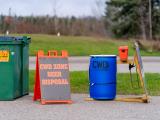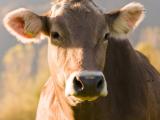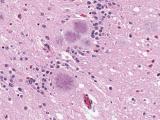Aug 11, 2006 (CIDRAP News) Canadian authorities have concluded their investigation of the sixth case of bovine spongiform encephalopathy (BSE), confirmed on Jul 3 in a cow from Manitoba.
The Canadian Food Inspection Agency (CFIA), in an Aug 8 announcement on the investigation, said that the advanced age of the cow, believed to be at least 16 years, limited the CFIA's ability to collect information about the animal's early health history, including its birth farm.
Investigators traced 21 herd mates that had been purchased with the animal; one was still alive and tested negative for BSE. Investigators suspect the cow was exposed in 1989 or 1990 when the cow was very young and when meat and bone additives in cattle feed were accepted and legal. Cattle are most susceptible to BSE infection during their first year,.
Two female calves born to the cowone in 2004 and one in 2005that investigators attempted to trace were presumed dead. Neither was registered by birth date in the Canadian Cattle Identification Agency database, which some countries require for export.
The CFIA reviewed the feed and management practices on the farm where the animal lived and determined that the farm's cattle had access only to feed products that were appropriate for cattle.
The carcass and hide from the infected cow, along with other contaminated materials, were placed under control and deep buried according to provincial environmental regulations, the CFIA report said. No part of the animal's carcass entered the human food or animal feed systems.
The disease was detected through Canada's ongoing BSE surveillance program.
Canada reported two BSE cases in July. The CFIA said it expects that a report on the investigation of the seventh case, a 50-month-old cow from Alberta, will be finalized in a few days. That case raised concerns in Canada and the United States because it was born after 1997 when Canada banned the use of cattle protein in feed for cattle and other ruminants.
On Jun 26, Canada announced that it has toughened its feed ban by prohibiting cattle parts from all animal feeds, pet foods, and fertilizers, making Canada's restrictions tighter than those in the United States.
Meanwhile, in the United States the US Food and Drug Administration announced two animal feed recalls on Aug 2 because both products were suspected of being contaminated with ruminant protein or bone meal.
One recall affected about 27 million pounds of dairy feed made between February 2005 and Jun 16 by Gagetown, Mich.based Vita Plus Corporation for distribution in Michigan. The recall involves an undetermined amount of a custom animal feed made by Burkmann Feeds, LLC, based in Glasgow, Ky. for distribution in Kentucky. The feed contains an ingredient called Pro-Lak that may include ruminant meat or bone meal.
See also:
Aug 8 CFIA complete investigative report on sixth BSE case
Aug 9 FDA enforcement report that lists animal feed recall















